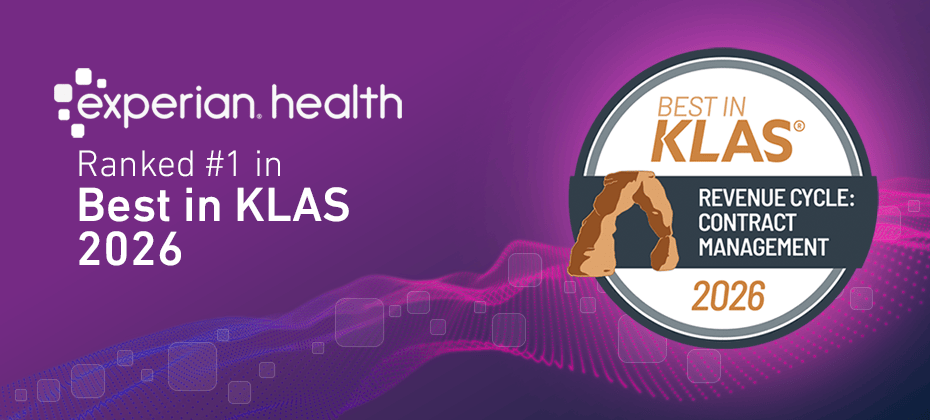
As revenue cycle leaders continue to navigate an increasingly complex financial landscape, preventing healthcare claim denials remains the number one priority. Experian Health’s State of Claims 2022 report found that 30% of respondents see claims denied 10-15% of the time, while 42% were seeing the rate of denials increase year over year. Denials in healthcare, which can be easily avoided, contribute significantly to the waste of healthcare funds. These denials cause providers to lose hundreds of billions of dollars in profits annually. This blog looks at the key questions providers should ask to get to the bottom of why healthcare claims get denied, how to prevent healthcare claim denials and ways technology can support better denial management.
Why do healthcare claims get denied?
The State of Claims 2022 survey revealed that the most common causes of denied claims boil down to three issues:
1. Missing or incomplete prior authorizations
Health insurers use prior authorizations to determine whether a patient’s treatment is medically necessary and how much they can cover. Despite being introduced to encourage delivering high-quality, cost-effective care, the authorization process has become an intimidating administrative burden for healthcare providers. Even now, many healthcare providers rely on manual paperwork to execute an already complex and tedious authorization process.
This outdated approach to authorization not only consumes time and money but also creates opportunities for missing or incomplete prior authorizations, increasing claims denial rates. Unsurprisingly, 48% identified missing or incomplete prior authorizations as one of the top three reasons for denials.
2. Failure to verify provider eligibility
To be eligible for reimbursement, a provider must be a participant in the proposed Medicare or Medicaid program or other private health insurance plan. Eligibility verification involves confirming a patient’s insurance information and that the planned services and provider are under their plan, which is critical for successful claims approval. Failure to verify provider eligibility may lead to claims denial if an out-of-network provider provides the services. Likewise, 42% of respondents said failure to verify provider eligibility was a common reason for denials.
3. Inaccurate medical coding
Accuracy is the backbone of medical coding, another administrative task indispensable to claims approval. The slightest mistake when translating patients’ diagnostic and treatment information into clinical codes can result in rejected claims.
Unfortunately, providers are susceptible to coding errors due to the ever-changing coding rules, especially when they do it manually or work with unreliable automation solutions. They may work with outdated or incorrect codes, leading to claims denials. The State of Claims 2022 survey revealed similar shortcomings, with 42% of respondents stating that inaccurate medical coding led to denial.
Other reasons for denied claims include:
- Incorrect modifiers
- Failure to meet submission deadlines
- Patient information inaccuracy
- Missing or inaccurate claim data
- Not enough staff to keep up
- Formulary changes
- Changing policies
- Procedure changes
- Improperly bundled services
- Service not covered
6 in 10 respondents said insufficient data and analytics made identifying and resolving issues with claims submissions difficult. A similar number said a lack of automation was hindering operational improvements. The good news is that these obstacles can all be effectively addressed with the right denial management strategy and digital tools.
How do claim denials affect revenue cycles?
Denials can be justified as necessary to prioritize spending on high-value care, but they have heavy consequences for hospitals’ financial health. As highlighted in the Journal of Managed Care & Specialty Pharmacy, the weight of denied claims adds up to about $260 billion each year. This financial burden is pushed on hospitals, who may need to classify denied claims as debt, which, among other consequences of claims denial, ultimately disrupts their revenue cycles.
The ripple effect of denied and underpaid claims on hospital revenue cycles also manifests in how delayed and non-payments restrict cash flow, hampering the provider’s ability to operate efficiently and deliver care effectively. Significant staff time is lost to avoidable administrative activities and rework, as claims need to be corrected and resubmitted. This creates a bottleneck in the revenue cycle, which can lead to decreased revenue and additional costs. Extra work is particularly challenging for staff already under pressure due to ongoing labor shortages.
For patients, denials can cause stress and confusion around how the cost of care will be met.
How can providers reduce or prevent healthcare claim denials?
Since most denials result from inaccuracies that originate early in the patient journey, the solution calls for better data management in patient access and robust checks just before claims are submitted. Reducing claims errors will contribute to better claim submission and higher reimbursement rates.
Here’s a step-by-step guide to improving healthcare claims processing:
- Utilize prior authorization software to automate the prior authorization process. This software-driven solution automates inquiries and submissions using updated and stored payer data, making the prior authorization process seamless and time-efficient and resulting in higher claim approval rates.
- Upgrade claims technology with tools such as ClaimSource®, which helps providers manage the entire claims cycle from one platform. By automating claims processing, ClaimSource helps ensure claims are clean before being submitted. The tool creates custom work queues so staff can prioritize high-value tasks and get paid faster.
- Improve the claims management process and prevent healthcare claim denials with AI Advantage™ — Predictive Denials and AI Advantage™ — Denial Triage. Predictive Denials flags claims that are more likely to be denied before they are submitted to the payer and tracks payer rule changes, reducing denial rates. Denial Triage prioritizes and segments denials most likely to be reimbursed, leading to increased revenue.
- Automate line-by-line claim reviews with Claim Scrubber to eliminate errors or omissions in claims before they are submitted. Claim Scrubber makes claims management operations more efficient, resulting in less rework, administrative costs, and delays. It can also be paired with Contract Manager, so providers can audit claims before and after remittance.
- Use an early-and-often approach to monitoring claim status and expedite reimbursement. Enhanced Claim Status eliminates manual follow-up and helps providers react quickly to any pending, returned-to-provider, denied, or zero-pay transactions, further improving cash flow.
What is the best way to track and manage claim denials?
Most providers rely on manual and automated processes to manage claims and denials. Shifting from manual to digital can save time, reduce errors, and increase overall efficiency. However, providers may be wary of implementing new systems due to concerns about costs, data interoperability, and the staff learning curve. For this reason, it’s essential to select a denials management solution that fits the provider’s unique specifications.
Denials Workflow Manager eliminates manual processes and allows providers to optimize the claims process according to the metrics that matter to them. It generates work lists based on the client’s specifications, such as denial category and dollar amount, and incorporates extensive data analysis capabilities to identify the root causes of denials and improve upstream processes to prevent them. It can be easily implemented as a standalone product or integrated with ClaimSource to give users access to the entire claims and denial management cycle on a single screen.
Staff training on claims management
The State of Claims 2022 report revealed that 46% of respondents admitted that lack of staff training was an operational challenge contributing to claims denial. Training healthcare staff in managing and preventing claim denials is one of the most worthy investments to reduce the rate of claim denials.
Hospitals can provide healthcare staff with adequate ongoing training on the granular details of claims processes before and after submission and access to automated claims management solutions. Healthcare staff should also be kept up-to-date on the latest tools and strategies on denial prevention and payer rules for claims submissions to ensure payment receipt after claim submission.
Engaging patients in the claims process
Though patients are usually not responsible for submitting claims to payers, they are an equal third party in the claims process and can be empowered to actively participate in every stage, from submission to approval and paying copays or deductibles.
Effective patient engagement can be achieved by providing patients with an accessible, all-inclusive platform to register, review, and update information related to their care and benefit plan and communicate with healthcare staff as needed.
Collaborating with payers to reduce denials
The quality of collaboration between payers and providers affects the seamlessness and efficiency of the claims process. Therefore, it is crucial for providers to collaborate effectively with payers, especially given the constant changes in payer policies, to ensure that they stay up-to-date with and comply with the payer claims submission requirements. In cases of claim denials, they can also manage them effectively.
By working together, payers and providers can also quickly resolve denial issues, ultimately improving system efficiency.
Adopting automation and AI to prevent healthcare claim denials
As one of the most complex institutions today, the healthcare industry has always grappled with a critical shortage of healthcare workers, staff burnout, and wasteful medical care spending, which costs $600 billion annually in the US. Despite the potential benefits of automation and artificial intelligence (AI) to ease these burdens and save about $200 billion to $360 billion annually in healthcare spending, their adoption has been lagging and met with resistance.
However, more and more healthcare stakeholders are realizing that these technologies are a principal partner in making the healthcare system more efficient, simplifying and streamlining deeply complex processes, such as claims processing.
For example, Experian Health’s Patient Access Curator, an AI—and robotic process automation (RPA)-driven solution that enables eligibility and coverage verification and more accurate and submission-ready claims. By performing these tasks in seconds, all in one click, Patient Access Curator has helped clients save over $1 billion in denied claims since 2020, significantly boosting their bottom lines.
Another example of efficient claims technology is ClaimSource. This all-in-one claim cycle management platform, powered by automation, transmitted $632 million in claims within five days and processed $1.1 billion of claims backlog for IU Health.
AI Advantage™, Experian Health’s revolutionary claims management solution that offers a two-pronged approach to preventing and managing denials:
- AI Advantage – Predictive Denials identifies claims that are at risk of being denied, so corrections can be made before claims are sent to payers.
- AI Advantage – Denial Triage comes into play post-submission, reviewing patterns in denials to prioritize those with the greatest likelihood of reimbursement.
Given the volume, complexity and financial impact of the current claims workload, automation and AI are critical elements in the denials management toolkit. In the State of Claims survey, more than half of respondents said they were using automated claims processing, with many using automation to keep track of payer policy changes, automate patient portal claims reviews and digitize patient registration.
Despite much media furor, AI is still the domain of early adopters: only 11% of respondents said they were using AI. But while automation can effectively eliminate unnecessary manual tasks, AI is a force multiplier for denials management, offering additional predictive capabilities and “learning” from historical data to prevent denials.
Client feedback to date suggests that incorporating AI-powered denial management solutions could be a game-changer for providers looking to streamline operations, prevent lost revenue and free up capacity to focus on their primary mission of delivering quality patient care.
Technology solutions for managing and preventing claim denials
Efficiently managing the claims process and preventing or resolving claims denial requires robust and reliable technology solutions at every stage, especially in the complex and constantly changing world of claims management, where everything hinges on accuracy. These technology solutions can be responsible for heavy lifting many administrative tasks involved in the claims processes, from accurate data capturing during patient registration and prior authorization to submission to monitoring claim status and addressing claims submission outcomes.
Hospitals can adopt claims technology, such as Experian Health’s Patient Access Curator, for verifying insurance eligibility and coverage with real-time patient data correction or ClaimSource®, a single platform for monitoring and managing the claims cycle in one place.
Find out more about how Experian Health helps healthcare providers prevent healthcare claim denials with automation and AI.


